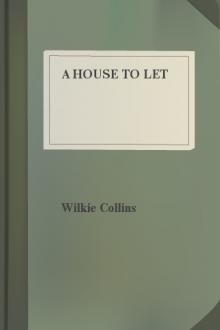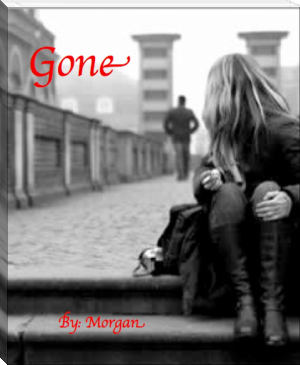A House to Let by Charles Dickens (book recommendations based on other books .txt) 📕

- Author: Charles Dickens
- Performer: -
Book online «A House to Let by Charles Dickens (book recommendations based on other books .txt) 📕». Author Charles Dickens
I perceived, you understand, that he was soured by his misfortunes, and I felt for Mr. Chops.
“As to Fat Ladies,” he says, giving his head a tremendious one agin the wall, “there’s lots of them in Society, and worse than the original. Hers was a outrage upon Taste—simply a outrage upon Taste—awakenin contempt—carryin its own punishment in the form of a Indian.” Here he giv himself another tremendious one. “But theirs, Magsman, theirs is mercenary outrages. Lay in Cashmeer shawls, buy bracelets, strew ’em and a lot of ’andsome fans and things about your rooms, let it be known that you give away like water to all as come to admire, and the Fat Ladies that don’t exhibit for so much down upon the drum, will come from all the pints of the compass to flock about you, whatever you are. They’ll drill holes in your ’art, Magsman, like a Cullender. And when you’ve no more left to give, they’ll laugh at you to your face, and leave you to have your bones picked dry by Wulturs, like the dead Wild Ass of the Prairies that you deserve to be!” Here he giv himself the most tremendious one of all, and dropped.
I thought he was gone. His Ed was so heavy, and he knocked it so hard, and he fell so stoney, and the sassagerial disturbance in him must have been so immense, that I thought he was gone. But, he soon come round with care, and he sat up on the floor, and he said to me, with wisdom comin out of his eyes, if ever it come:
“Magsman! The most material difference between the two states of existence through which your unhappy friend has passed;” he reached out his poor little hand, and his tears dropped down on the moustachio which it was a credit to him to have done his best to grow, but it is not in mortals to command success,—“the difference this. When I was out of Society, I was paid light for being seen. When I went into Society, I paid heavy for being seen. I prefer the former, even if I wasn’t forced upon it. Give me out through the trumpet, in the hold way, to-morrow.”
Arter that, he slid into the line again as easy as if he had been iled all over. But the organ was kep from him, and no allusions was ever made, when a company was in, to his property. He got wiser every day; his views of Society and the Public was luminous, bewilderin, awful; and his Ed got bigger and bigger as his Wisdom expanded it.
He took well, and pulled ’em in most excellent for nine weeks. At the expiration of that period, when his Ed was a sight, he expressed one evenin, the last Company havin been turned out, and the door shut, a wish to have a little music.
“Mr. Chops,” I said (I never dropped the “Mr.” with him; the world might do it, but not me); “Mr. Chops, are you sure as you are in a state of mind and body to sit upon the organ?”
His answer was this: “Toby, when next met with on the tramp, I forgive her and the Indian. And I am.”
It was with fear and trembling that I began to turn the handle; but he sat like a lamb. I will be my belief to my dying day, that I see his Ed expand as he sat; you may therefore judge how great his thoughts was. He sat out all the changes, and then he come off.
“Toby,” he says, with a quiet smile, “the little man will now walk three times round the Cairawan, and retire behind the curtain.”
When we called him in the morning, we found him gone into a much better Society than mine or Pall Mall’s. I giv Mr. Chops as comfortable a funeral as lay in my power, followed myself as Chief, and had the George the Fourth canvass carried first, in the form of a banner. But, the House was so dismal arterwards, that I giv it up, and took to the Wan again.
* * * * *
“I don’t triumph,” said Jarber, folding up the second manuscript, and looking hard at Trottle. “I don’t triumph over this worthy creature. I merely ask him if he is satisfied now?”
“How can he be anything else?” I said, answering for Trottle, who sat obstinately silent. “This time, Jarber, you have not only read us a delightfully amusing story, but you have also answered the question about the House. Of course it stands empty now. Who would think of taking it after it had been turned into a caravan?” I looked at Trottle, as I said those last words, and Jarber waved his hand indulgently in the same direction.
“Let this excellent person speak,” said Jarber. “You were about to say, my good man?”—
“I only wished to ask, sir,” said Trottle doggedly, “if you could kindly oblige me with a date or two in connection with that last story?”
“A date!” repeated Jarber. “What does the man want with dates!”
“I should be glad to know, with great respect,” persisted Trottle, “if the person named Magsman was the last tenant who lived in the House. It’s my opinion—if I may be excused for giving it—that he most decidedly was not.”
With those words, Trottle made a low bow, and quietly left the room.
There is no denying that Jarber, when we were left together, looked sadly discomposed. He had evidently forgotten to inquire about dates; and, in spite of his magnificent talk about his series of discoveries, it was quite as plain that the two stories he had just read, had really and truly exhausted his present stock. I thought myself bound, in common gratitude, to help him out of his embarrassment by a timely suggestion. So I proposed that he should come to tea again, on the next Monday evening, the thirteenth, and should make such inquiries in the meantime, as might enable him to dispose triumphantly of Trottle’s objection.
He gallantly kissed my hand, made a neat little speech of acknowledgment, and took his leave. For the rest of the week I would not encourage Trottle by allowing him to refer to the House at all. I suspected he was making his own inquiries about dates, but I put no questions to him.
On Monday evening, the thirteenth, that dear unfortunate Jarber came, punctual to the appointed time. He looked so terribly harassed, that he was really quite a spectacle of feebleness and fatigue. I saw, at a glance, that the question of dates had gone against him, that Mr. Magsman had not been the last tenant of the House, and that the reason of its emptiness was still to seek.
“What I have gone through,” said Jarber, “words are not eloquent enough to tell. O Sophonisba, I have begun another series of discoveries! Accept the last two as stories laid on your shrine; and wait to blame me for leaving your curiosity unappeased, until you have heard Number Three.”
Number Three looked like a very short manuscript, and I said as much. Jarber explained to me that we were to have some poetry this time. In the course of his investigations he had stepped into the Circulating Library, to seek for information on the one important subject. All the Library-people knew about the House was, that a female relative of the last tenant, as they believed, had, just after that tenant left, sent a little manuscript poem to them which she described as referring to events that had actually passed in the House; and which she wanted the proprietor of the Library to publish. She had written no address on her letter; and the proprietor had kept the manuscript ready to be given back to her (the publishing of poems not being in his line) when she might call for it. She had never called for it; and the poem had been lent to Jarber, at his express request, to read to me.
Before he began, I rang the bell for Trottle; being determined to have him present at the new reading, as a wholesome check on his obstinacy. To my surprise Peggy answered the bell, and told me, that Trottle had stepped out without saying where. I instantly felt the strongest possible conviction that he was at his old tricks: and that his stepping out in the evening, without leave, meant—Philandering.
Controlling myself on my visitor’s account, I dismissed Peggy, stifled my indignation, and prepared, as politely as might be, to listen to Jarber.
THREE EVENINGS IN THE HOUSE NUMBER ONE.I.
Yes, it look’d dark and dreary
That long and narrow street:
Only the sound of the rain,
And the tramp of passing feet,
The duller glow of the fire,
And gathering mists of night
To mark how slow and weary
The long day’s cheerless flight!
II.
Watching the sullen fire,
Hearing the dreary rain,
Drop after drop, run down
On the darkening window-pane;
Chill was the heart of Bertha,
Chill as that winter day,—
For the star of her life had risen
Only to fade away.
III.
The voice that had been so strong
To bid the snare depart,
The true and earnest will,
And the calm and steadfast heart,
Were now weigh’d down by sorrow,
Were quivering now with pain;
The clear path now seem’d clouded,
And all her grief in vain.
IV.
Duty, Right, Truth, who promised
To help and save their own,
Seem’d spreading wide their pinions
To leave her there alone.
So, turning from the Present
To well-known days of yore,
She call’d on them to strengthen
And guard her soul once more.
V.
She thought how in her girlhood
Her life was given away,
The solemn promise spoken
She kept so well to-day;
How to her brother Herbert
She had been help and guide,
And how his artist-nature
On her calm strength relied.
VI.
How through life’s fret and turmoil
The passion and fire of art
In him was soothed and quicken’d
By her true sister heart;
How future hopes had always
Been for his sake alone;
And now, what strange new feeling
Possess’d her as its own?
VII.
Her home; each flower that breathed there;
The wind’s sigh, soft and low;
Each trembling spray of ivy;
The river’s murmuring flow;
The shadow of the forest;
Sunset, or twilight dim;
Dear as they were, were dearer
By leaving them for him.
VIII.
And each year as it found her
In the dull, feverish town,
Saw self still more forgotten,
And selfish care kept down
By the calm joy of evening
That brought him to her side,
To warn him with wise counsel,
Or praise with tender pride.
IX.
Her heart, her life, her future,
Her genius, only meant
Another thing to give him,
And be therewith content.
To-day, what words had stirr’d her,
Her soul could not forget?
What dream had fill’d her spirit
With strange and wild regret?
X.
To leave him for another:
Could it indeed be so?
Could it have cost such anguish
To bid this vision go?
Was this her faith? Was Herbert
The second in her heart?
Did it need all this struggle
To bid a dream depart?
XI.
And yet, within her spirit
A far-off land was seen;
A home, which might have held her;
A love, which might have been;
And Life: not the mere being
Of daily ebb and flow,
But Life itself had claim’d her,
And she had let it go!
XII.
Within her heart there echo’d
Again the well-known tune
That promised this bright future,
And ask’d her for its own:
Then words of sorrow, broken
By half-reproachful pain;
And then a farewell, spoken
In words of cold disdain.
XIII.
Where now was the stern purpose
That nerved her soul so long?
Whence came the words she utter’d,
So hard, so cold, so strong?
What right had she to banish
A hope that God had given?
Why must she choose earth’s portion,
And turn aside from Heaven?
XIV.
To-day! Was it this morning?
If this long, fearful strife
Was but the work of hours,
What would be years of life?
Why did a cruel Heaven
For such great suffering call?
And why—O, still more cruel!—
Must her own words do all?
XV.
Did she repent? O Sorrow!
Why do we linger still
To take thy loving message,
And do thy gentle will?
See, her tears fall more slowly;
The passionate murmurs cease,
And back upon her spirit
Flow strength, and love, and peace.
XVI.
The fire burns more brightly,
The rain has passed away,
Herbert will see no shadow
Upon his home to-day;
Only that Bertha greets him
With doubly tender care,
Kissing a fonder blessing
Down on his





Comments (0)